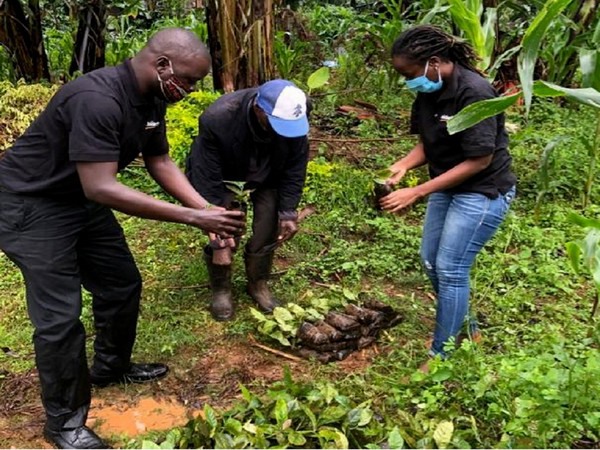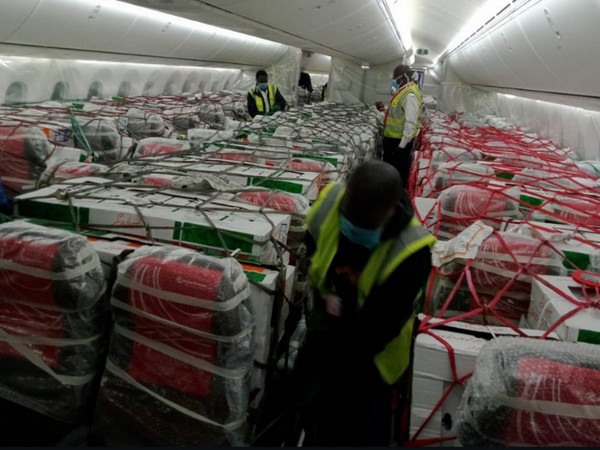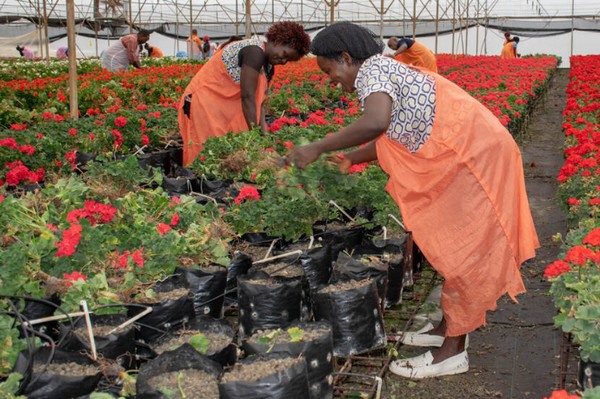Mid-March 2020, the number of COVID-19 cases is rising around the world, until then both Tanzania and Kenya have not been hit hard but caution was advised. Both governments within a short amount of time decide to put multiple measures in place to control the situation, to limit the possible impact. In Kenya a curfew is put in place, country and county boarders close and only essential shops stay open. In Tanzania restrictions were also implemented to curb the spread of the virus. These measures naturally impacted the way businesses continue their day-to-day operations.

Working while implementing social distancing and personal protection. Credit: Solidaridad Tanzania
Can we keep going as usual?
For one, social distancing protocols make it difficult, if not impossible to work within old structures. A clear example faced by many agribusinesses in Kenya, is that with the curfew in place employers had to house staff on the farm to make sure everyone is able to make it to work and back home without breaking the curfew. Moreover, contacts of the Dutch embassy indicated that doing business is not as easy as before, mainly because they face the challenge of guaranteeing the safety of their staff. Several businesses decided that staff can no longer make use of public transport, a before often used mean of transportation. Putting pressure on companies to continue business as usual with less staff.
At the same time, many office workers had to change to working remotely, from home. Although the work stays often the same this does require a very different approach from both the employee, the manager and the families who are now often more closely involved. But also what to do with the signing of documents? One flower farm, indicated that they implemented what would have been seen as impossible before, online signatures. When productivity is at stake, radical change in the way of working was required.
“By cutting out the paper trail, implementing online signatures, and allowing a great flexibility in the way of working, we made working remotely possible.” – Flower Farmer in Kenya
COVID-19 forced companies to re-evaluate their processes, which in some cases let to a more efficient and flexible way of working.
Demand and supply
For some companies, the demand and supply of inputs wasn’t affected, or not directly. For others the situation continuous to change every other day. With less passenger flights the availability of cargo transport dropped significantly and with less events around the world the demand for flowers and specific food products decreased. This not only affected the export market, also local markets and service providers quickly noted a change.
“In Tanzania we saw that more and more people are getting involved into agriculture because food is always needed also during a crisis like COVID-19.” - Honorary Council of the Netherlands in Tanzania.

Flowers on the seats that normally are used by passengers, one way to keep the air bridge to Europe open. Credit: FPEAK
Due to extensive lobbying from both private and public partners the availability of cargo flights increased rather quickly. Positively impacting the markets focused on export, even though things have not yet returned to the old situation.
The new normal?
As an entrepreneur one always needs to develop, to innovate and show the flexibility that comes with entrepreneurship, but the need for these skills has become more apparent now than ever before. When listing to the stories of the entrepreneurs in their network, the Dutch embassies clearly see the adaptability of entrepreneurs. Flower farmers changing to new markets, horticulture farms choosing different crops or expanding in terms of diversity and suppliers and service providers extending their scope, approach and knowledge. The COVID-19 period pushed many to work on developing new skills, interests and looking where to diversify or maybe increase their scope.

Employees in the floriculture share their experiences as they continue their work
Rapid change is never easy and changing due to something that’s out of your own control might be even harder. Even when focusing on the positive sides of the situation, we have to acknowledge that letting go of staff, downsizing and ending business relationships might also have been necessary to get through this situation.
The agriculture network in your country is there to help, share information through frequent updates on our website and support you to the best of our ability. Are you a Dutch company active internationally, then you can also apply for a Kickstarter voucher, a onetime fund to hire an external advisor to discuss how to minimalize the impact of COVID-19 on your company.
Would you like to discuss your situation, expand your network and look in to how the agricultural team of the Embassy can be there for you during COVID-19 and in the aftermath? Please reach out to them, also with all other questions for the agriculture department by sending an email addressed directly to nai-lnv@minbuza.nl for Kenya and dar-lnv@minbuza.nl for Tanzania. For the latest updates, follow them on Twitter on @NLAgiKenya & @NLAgriTanzania. Please also sign up for their newsletter with updates and opportunities even during CoVID-19 by sending an email.
Source: www.agroberichtenbuitenland.nl
